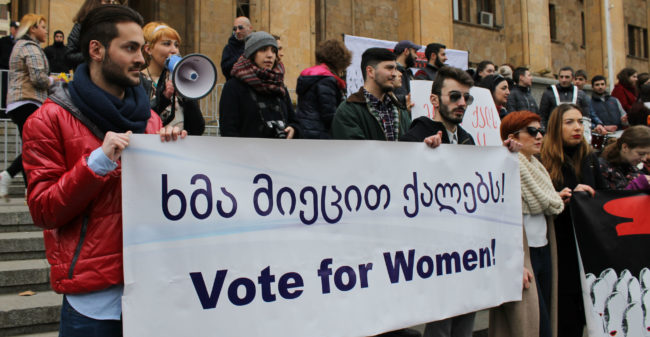
 A study ranking gender equality in political parties in Georgia funded by Netherlands Institute for Multiple Democracy (NIMD), has found that women are underrepresented in the top political parties in the country, with ‘gender equality indexes’ between 17% and 41%.
A study ranking gender equality in political parties in Georgia funded by Netherlands Institute for Multiple Democracy (NIMD), has found that women are underrepresented in the top political parties in the country, with ‘gender equality indexes’ between 17% and 41%.
According to the research, the ruling Georgian Dream party has the worst gender equality among Georgia’s top political parties, with a score of only 17%. The main opposition United National Movement came in third, with 31,9%. The Republican Party scored highest, with 41%, followed by the Alliance of Patriots in second, with 32.4%.
The ‘Gender Equality Assessment Among Political Parties of Georgia’ study focused on the seven ‘most relevant’ political parties in the country — those who received at least 1% of votes in the 2016 elections and were registered by 2015.
The aggregate index consists of three components — institutional, programmatic and electoral equality. The electoral dimension contributes 50% to the aggregate score, while institutional and programmatic dimensions contribute 25% each.
The Alliance of Patriots received the highest score in the electoral dimension, due to the high proportion of women from the party elected to parliament. Three out of six MPs elected through the proportional ballot were women. This greatly affected their overall score as four out of the seven parties failed to obtain any seats in parliament.
None of the seven parties were found to have any formal rules or quotas to promote gender equality, although parties did emphasize the existence of the informal trends, the researchers could not take them into account given the criteria requirements.
NIMD suggested that a system of proportional representation is generally more favorable to minority representation and gender representation. The research suggested that young democracies like Georgia should opt for this electoral system for variety of other reasons as well, including that it promotes political pluralism.
The low number of women in politics is a reflection of the complex socioeconomic context of Georgia, the survey explains. It claims that a dependence on the ‘clientelistic potential’ of candidates makes women ‘less suited to offer viable options as potential candidates for the parties’.
Given the current state of affairs, the NIMD survey suggests that the only force that could positively impact gender equality in political parties, and their overall democratisation, is the international community. ‘All of the interviews with the party representatives tell the same tale — all the achievements made so far in pursuing these twin goals [gender equality and democratisation] were accomplished by the support of various international governmental and nongovernmental organizations’, the research claims.
A survey by the Public Defender’s Office of Georgia released earlier in April claimed that the Georgian government has not taken significant measures to promote gender equality, and no positive changes have been seen over the past year, leading to the exclusion of women from politics.




 5 April 2017
5 April 2017


